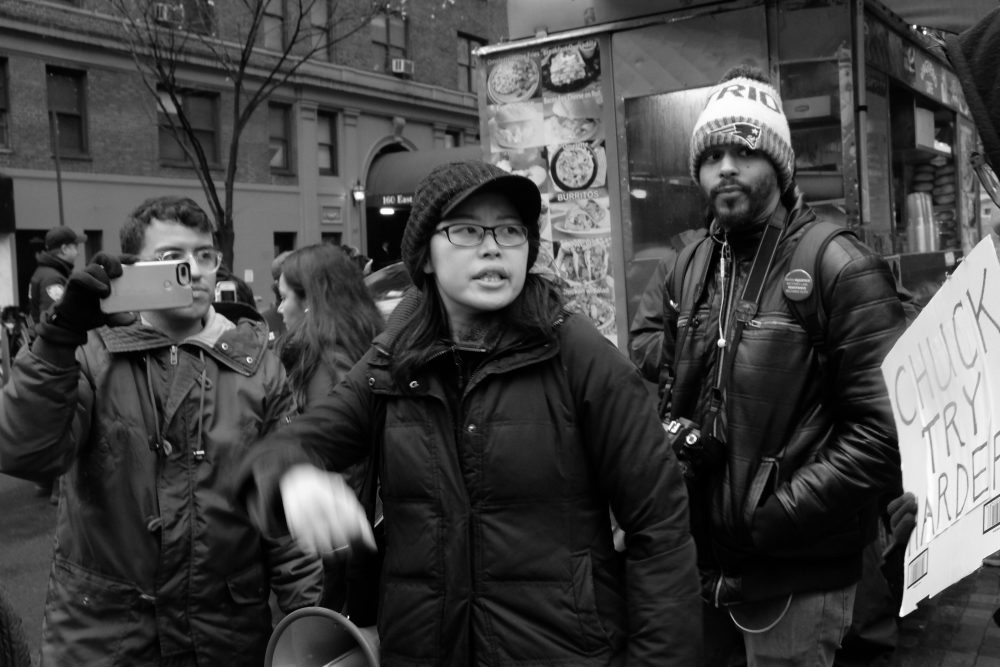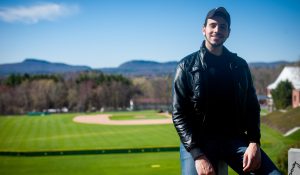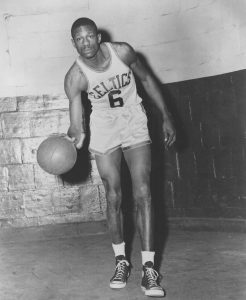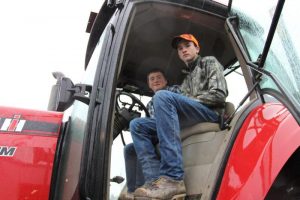Episode 77: A Seat at the Table

A woman who’s widely referred to as the “original Dreamer” weighs in on the current moment in immigration. A young man shares a tale of rising above poverty, homelessness, and undocumented status. Plus, does Boston deserve its racist reputation, and what’s being done to move beyond it? We discuss takeaways from the Boston Globe’s series on racism with columnist Adrian Walker. We get a critical look at offshore wind from across the pond, and rethink a potato-focused school break.

Tereza Lee, center, protests in New York City on Wednesday. Lee – whose parents brought her to the U.S. as a child without documents – reached out to Sen. Richard Durbin about her family’s status as a teenager. Durbin would go on to introduce the DREAM Act in Congress. (Courtesy Tereza Lee)
They Had a Dream
This week, the fate of young immigrants across New England has been at the center of a Washington political debate over DACA — or Deferred Action for Childhood Arrivals. And, they’ve been a chip in a bigger political fight over keeping the government open. At stake is whether these so-called “Dreamers” – who were brought to the country illegally by their parents years ago – will be allowed to stay, or be forced to return to countries many of them don’t consider home.
The movement behind the DREAM Act began nearly 20 years ago when an undocumented teenager in Chicago wrote to her senator. WBUR’s Shannon Dooling sat down with Tereza Lee, the woman known as the original “Dreamer.”

Saul Grullon, a native of the Dominican Republic, was abused by his parents because of his sexuality. (Beth Reynolds|Joyce Showyra/ NEPR)
While Tereza Lee grew up with the fear of being separated from her family, Dominican-born Saul Grullon sought refuge from his family in the immigration system.
Grullon come out to his family as gay when he was a teenager living in New Jersey, and he encountered such hostility that it felt dangerous to stay at home. Grullon was undocumented, but he was able to apply for a temporary visa through VAWA — the Violence Against Women Act. He told his moving story for New England Public Radio’s “Words in Transit” project.
Is Boston Racist?
About a year ago, Boston Mayor Marty Walsh took a staunchly pro-immigrant stand in the face of President Trump’s executive order pledging to strip funding from so-called “sanctuary cities.” Walsh said that people fearing deportation could live at city hall, if they wanted. Other cities in the greater Boston metropolitan area also promised to do what they could to protect immigrants.
But there’s another group whose members don’t always feel welcome in Boston: African Americans.
Saturday Night Live cast member Michael Che brought up this sentiment before last year’s Superbowl — when the Patriots played against the Atlanta Falcons.
Sport and race have long been a sore spot in the city, but the history goes much deeper.
Protests and riots around court-ordered school desegregation in the 1970s were a particularly ugly time for African Americans in Boston — one that’s left lasting scars.
“I remember riding the buses to protect the kids going up to South Boston High School. And the bricks through the window. Signs hanging out those buildings, ‘Nigger Go Home.’ Pictures of monkeys. The words. The spit. People just felt it was all right to attack children.” – bus safety monitor Jean McGuire, a speaking with WBUR in 2014.

Bill Russell experienced discrimination as the only black member of the Boston Celtics during the 1956-1957 season, his rookie year.
The Boston Globe’s Spotlight Team is known for investigations into issues like political corruption and sex abuse in the Catholic Church. Last fall the investigative unit took on what they call their most difficult question yet: Does Boston deserve its reputation as a racist city –and a place that’s unfriendly to blacks in particular? Their reporting series “Boston. Racism. Image. Reality” was published in print and online in December.
Our guest Adrian Walker is a columnist for the Metro section of the Boston Globe. Walker is part of the team behind the Spotlight series, where he wrote about professional sports and fan culture.
Winds of Change

Fisherman Steve Barratt is aboard his boat Razorbill in the Ramsgate harbor in southeast England. Barratt says he’s lost valuable fishing ground to a wind farm in the Thames Estuary. (Chris Bentley/WBUR)
We’ve reported on plans to build wind farms in the waters off Massachusetts’ South Shore and in the Atlantic south of Long Island, and the opposition by some fishermen to those plans. But right now, aside from a small array of turbines off the coast of Rhode Island, the worries are theoretical. To get a sense of how big wind farms might affect fishing in New England’s future, WBUR reporter Chris Bentley visited fishermen working near giant wind farms in the United Kingdom.
If jobs in the new energy economy are seen as part of a growth industry, many in traditional farming communities have seen their way of life shrinking.

Carson (left) and Kyle Flewelling, pictured in 2014, worked 12-hour days on their family farm in Easton during harvest break, spading up about 700 acres of russets for the fry and chip markets. (Jennifer Mitchell/ Maine Public
In Maine’s northern Aroostook County the acreage for potato farming has shrunk over the last 50 years, and technology has reduced the demand for labor. That’s a big deal for high school students there, who have traditionally taken a three-week break from classes each fall to harvest potatoes.
With far fewer teenagers now working in the fields, the school board in the town of Presque Isle is looking at a new approach that could end the tradition of the October break, and bring the harvest into the classroom. Maine Public Radio’s Robbie Feinberg reports.
About NEXT
NEXT is produced at WNPR.
Host: John Dankosky
Producer: Andrea Muraskin
Executive Producer: Catie Talarski
Contributors to this episode: Shannon Dooling, Saul Grullon, John Voci, Tema Silk, Chris Bentley, and Robbie Feinberg
Music: Todd Merrell, “New England” by Goodnight Blue Moon, “Adapt and Prosper” by Akrobatic
We appreciate your feedback! Send praise, critique, suggestions, questions, story leads, and potato harvest selfies to next@wnpr.org.
